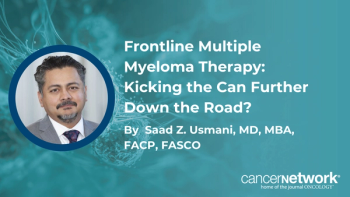
Gene Therapy/Osimertinib NSCLC Trial Advances to Phase 2 Expansion
The safety review committee of the phase 1/2 Acclaim-1 trial identifies a recommended phase 2 dose of quaratusugene ozeplasmid plus osimertinib in the management of advanced non–small cell lung cancer.
A safety review committee (SRC) has approved advancement of the phase 1/2 Acclaim-1 trial (NCT04486833), investigating quaratusugene ozeplasmid (REQORSA) plus osimertinib (Tagrisso) in the treatment of patients with advanced non–small cell lung cancer (NSCLC), into the second phase, according to a press release from Genprex.1
The SRC identified a recommended phase 2 dose (RP2D) of 0.12 mg/kg of quaratusugene ozeplasmid after the regimen produced no dose-limiting toxicities in the phase 1 portion of the trial. Investigators plan to initiate the phase 2 expansion portion of the study in the third quarter of 2023.
According to findings from an abstract published at the
The most common adverse effects (AEs) included myalgia, pyrexia, chills, and diarrhea. The only grade 3/4 AEs were neutropenia and lymphopenia in 1 patient each.
“As we move into the phase 2 expansion portion of the trial, we remain steadfast in our efforts to bring new therapies to patients [with lung cancer] with unmet medical need,” Rodney Varner, chairman, president, and chief executive officer at Genprex, said in the press release.
Quaratusugene ozeplasmid consists of a plasmid expressing a TUSC2 tumor suppressor gene, which is administered intravenously to specifically target cancer cells. The plasmid expresses the TUSC2 gene once taken up into a cancer cell, which manufacturers believe may interrupt cell signaling pathways that cause cancer cells to proliferate, effectively re-establishing pathways for apoptosis in cancer cells and modulating the immune response against cancer cells.
In the dose escalation portion of the phase 1/2 Acclaim-1 trial, patients received quaratusugene ozeplasmid intravenously every 21 days plus 80 mg of osimertinib orally daily. In the phase 2 expansion portion of the study, investigators plan to enroll about 66 patients, half of whom will have received only prior treatment with osimertinib and the other will have received prior osimertinib and chemotherapy. In phase 2, patients will be randomly assigned to receive quaratusugene ozeplasmid plus osimertinib or platinum-based chemotherapy.
The primary end point of the phase 2 expansion portion is progression-free survival. Secondary end points include the pharmacokinetics, time to progression, overall survival, overall response rate, and AEs.
Patients 18 years and older with histologically or cytologically documented stage III or IV or recurrent NSCLC are eligible for enrollment on the study. Additional eligibility criteria include having a clinical response to prior osimertinib for at least 4 months and EGFR-mutated disease.
The FDA previously gave fast track designation to quaratusugene ozeplasmid plus osimertinib for patients with previously treated NSCLC in January 2020.3
“We hope that fast track designation helps us bring our gene therapy to patients more rapidly and that our unique gene therapy platform is more widely recognized for its potential in cancer treatment,” Varner said in a press release at the time of the fast track designation.
References
- Genprex receives safety review committee approval to advance to phase 2 expansion portion of Acclaim-1 clinical trial of REQORSA® in combination with Tagrisso® in advanced non-small cell lung cancer. News release. Genprex, Inc. May 30, 2023. Accessed May 31, 2023. bit.ly/42o6ZpS
- Berz D, Jotte RM, Pachipala KK, Spira AI, Berger MS. ACCLAIM-1 dose escalation: determination of quaratusugene ozeplasmid and osimertinib recommended phase 2 dose (RP2D). J Clin Oncol. 2023;41(suppl 16):e15081. doi:10.1200/JCO.2023.41.16_suppl.e15081
- Genprex receives U.S. FDA fast track designation for gene therapy that targets lung cancer. News release. Genprex, Inc. January 21, 2020. Accessed May 31, 2023. bit.ly/43gwlXV
Newsletter
Stay up to date on recent advances in the multidisciplinary approach to cancer.






































